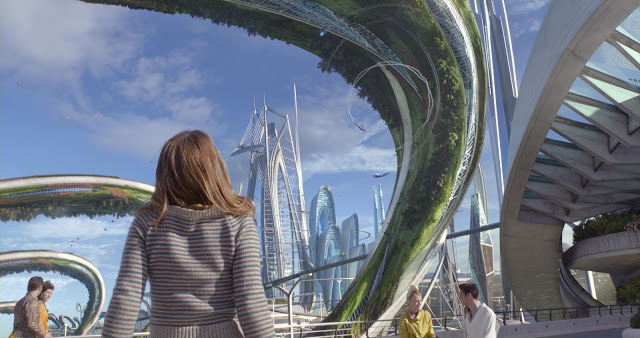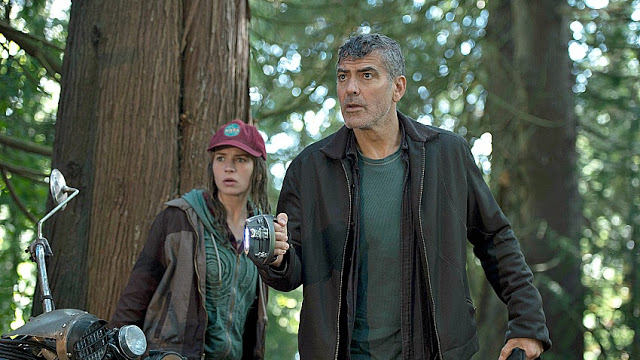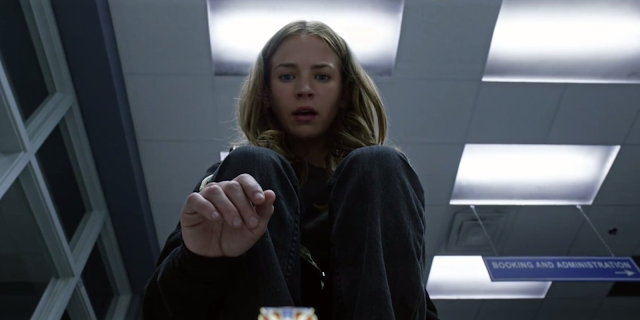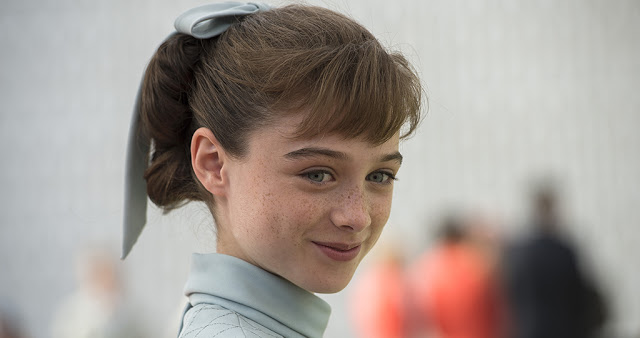With its imaginary worlds and bighearted humanism, Tomorrowland is practically engineered for viewers like me, those who crave original stories about plucky heroes and who don’t mind a dollop of sap mixed in with the sensation of wide-eyed discovery. It’s a sweet, irresistibly charming movie that’s also dangerously flimsy; tug too firmly at its threadbare construction, and it threatens to collapse into a puddle of moralism and solipsism. But while Tomorrowland, the second live-action feature from Brad Bird (following the rousing success of Mission: Impossible—Ghost Protocol), may be thinly sketched and frustratingly lacking in follow-through—no apologist can excuse its cratering final act—it remains for the most part a fun and fanciful story of lively adventure. It also deftly uses its childlike enthusiasm as a shield to camouflage its deficiencies. Tomorrowland has plenty of problems, but it’s tough to stay mad at a movie that’s so disarmingly cheerful.
Tomorrowland opens with some ungainly breaking of the fourth wall—Frank Walker (George Clooney) wants to warn the audience about the perils of the future, but he’s constantly interrupted by an offscreen character he’s squabbling with—before flashing back to 1964, when the young Frank (Thomas Robinson) tries to impress innovators at the World’s Fair with his homemade jetpack. Its inability to actually fly draws the derision of David (Hugh Laurie), but Frank’s indefatigable spirit catches the eye of David’s ostensible daughter, Athena (Raffey Cassidy, exceedingly natural). She slips Frank a mysterious T-shaped pin and, after he boards a ride for a little attraction called “It’s a Small World”—at this point, viewers my age will undoubtedly experience flashbacks to the Disney vacations of their own youth—he suddenly finds himself in a distant land in the clouds, a place of blue skies and friendly robots. This, in case you couldn’t tell, is Tomorrowland, and Frank appears destined to find happiness in this environment of blissful wonder.
Not so much. Or, as Clooney’s embittered voiceover informs us: “And then, everything went straight to Hell.” But where this prologue would constitute the entire opening act of a standard film, it’s really just a false start for Tomorrowland, which abruptly returns to the present day and plunks us inside the Florida home of Casey Newton (Britt Robertson, showing promise). Casey is, depending on your point of view, either an activist or a miscreant—she’s currently sabotaging NASA’s plans to demolish its launch pad in Cape Canaveral in order to preserve the sanctity of scientific discovery (not to mention save her father’s job). After a mishap with the law, she finds herself in possession of that enigmatic T-shaped pin, only as soon as she touches it, she’s magically transported to the outskirts of Tomorrowland. (Well, sort of. Her instantaneous journey appears to be virtual, as while Casey feels like she’s somewhere else, her physical body remains on Earth. This produces a number of scenes in which she blindly stumbles into walls, tumbles down stairs, and wades into swamps; these pratfalls suffer from diminishing returns, but Robertson sells them nicely.)
From there, Tomorrowland unspools as an easily pleasing yarn, following Casey as she discovers more about this world of grand plans and sinister androids. Desperate to uncover the origin of the pin, she leaves home and meets a pair of eccentric toy store owners, played by the reliably funny duo of Kathryn Hahn and Keegan Michael-Key (doubling down on his comic-relief work in Pitch Perfect 2). They’re weird, but weirder still is when Casey stumbles into Athena, who hasn’t aged a day since that ’64 flashback, and that—along with the movie’s nominal genre of science-fiction—is all you need to know to discern the workings of her biology. And of course, she runs into Frank himself, now played by Clooney as a cantankerous hermit who’s a cross between Clint Eastwood in Gran Torino and Gene Hackman in Enemy of the State (complete with a booby-trapped house that practically disintegrates at the first sign of trespassers). All the while, she’s pursued by a cadre of men in dark suits who are armed with high-tech weaponry and perpetual smiles (think Men in Black, with Tommy Lee Jones’s wry gruffness replaced by artificial politeness).
This is all thoroughly goofy, but it’s also a good deal of fun. Bird and co-writer Damon Lindelof may be pursuing a rigorous agenda—we’ll get to that—but for most of Tomorrowland, the director operates with a gratifyingly light touch. Despite the numerous action sequences, which Bird choreographs with zippy alacrity, you never sense that Casey is an any real danger. That may deprive the movie of stakes, but Tomorrowland doesn’t run on danger; its primary fuel is optimism, and it’s refreshing to watch a summer movie that doesn’t wallow in the doldrums of its protagonist’s angst. (It is also a relief not to have to fork over a few extra dollars for a meaningless and mercenary 3-D conversion.) The film also treats us to some spiffy locations, including Frank’s treacherous abode and the elegantly conceived title milieu, though none is more memorable than the interior of the Eiffel Tower, which at one point blasts off into outer space.
If you think that sounds hokey, you’re not wrong. But Tomorrowland‘s chipper tone feels sincere, thanks both to Bird’s feathery feel and to the film’s appealing character dynamics and sturdy acting. Casey and Frank have a familiar but enjoyable oil-and-water repartee, and Robertson—whose heart-shaped faced and blonde locks inescapably recall Jennifer Lawrence—more than holds her own while sharing the screen with a Hollywood icon. Frank’s more interesting relationship, however, is with Athena, a figure who is at once open and inscrutable. Some viewers may be perturbed by the concept of an implied romance between a middle-aged man and a 12-year-old girl, but it’s delicate and curiously touching, and it affords Clooney his one opportunity to actually emote. He’s otherwise on autopilot, or maybe he’s just upstaged, because the real find here is Cassidy, who is alarmingly poised and persuasive as a piece of walking hardware that exhibits glimmers of a human heart.
As perpetually pleasant and sporadically delightful as Tomorrowland is for its first hour-plus, it unfortunately becomes ponderous and preachy. The Earth, we learn, is ticketed for devastation, the consequence of our species’ continuous loop of selfishness and hatred, and only Casey, with all of her shining optimism, can do anything to reverse the curse. The literalness of this is stupefying (there’s even a countdown clock!), and to drive the point home, David delivers an insufferable monologue about the human race’s ingrained appetite for destruction. What begins as a rollicking tale of adventure ends with a bummer of a civics lesson.
Of course, David’s speech is not entirely inaccurate; turn on your television or scroll through your Twitter feed, and you will invariably be bombarded with very real stories of pain and suffering. But Tomorrowland approaches the seriousness of humanity’s problems with such facileness that it borders on vulgarity. Casey’s job is literally to “fix the world”, and Tomorrowland suggests that such a daunting task requires nothing more than old-fashioned perseverance and earnest goodwill. Bird, who got his start in animation (most critics revere his debut feature, The Iron Giant, but I’m more partial to his twin gems for Pixar, The Incredibles and Ratatouille), is clearly aiming at impressionable children with his simplistic message, which involves vague platitudes about the endurance of hope, the can-do attitude of dreamers, and other trite gobbledygook. “I know how things work,” Casey says with matter-of-fact confidence at one point. But Bird’s sermonizing reveals nothing about how the world actually works. All it proves is that there’s a profound difference between a story written for children and one that feels as though it were written by children.
And yet, while I wish Tomorrowland were a better movie, I’m still pleased that it exists, and I stubbornly believe that it heralds better things for the future. Bird needs his storytelling fundamentals to catch up to his filmmaking imagination, but once that happens, he’s capable of delivering something truly special. (Well, at least as special as Ratatouille and The Incredibles.) That may sound like blinkered optimism, but like Casey, I’m deliberately choosing to see the good here. Cinema isn’t perfect, and this movie is as memorable for its clumsiness and its proselytizing as for its admirable strangeness and creativity, but it’s nonetheless an original story with big ideas, plus a winning sense of wonder. In spite of all its flaws, it gives me hope. And hope, as Tomorrowland all too bluntly reminds us, is still worth something.
Jeremy Beck is the editor-in-chief of MovieManifesto. He watches more movies and television than he probably should.



